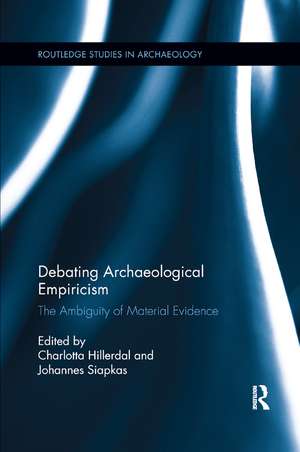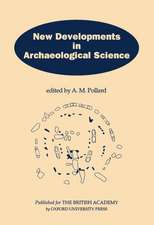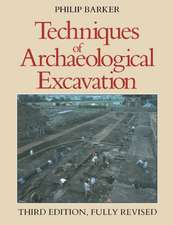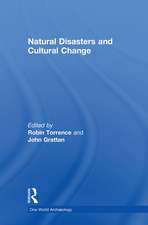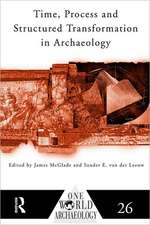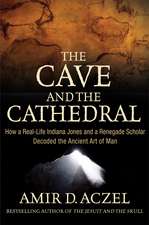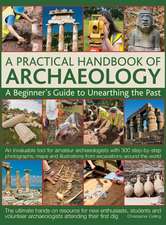Debating Archaeological Empiricism: The Ambiguity of Material Evidence: Routledge Studies in Archaeology
Editat de Charlotta Hillerdal, Johannes Siapkasen Limba Engleză Paperback – 10 dec 2019
| Toate formatele și edițiile | Preț | Express |
|---|---|---|
| Paperback (1) | 309.65 lei 3-5 săpt. | +16.25 lei 7-13 zile |
| Taylor & Francis – 10 dec 2019 | 309.65 lei 3-5 săpt. | +16.25 lei 7-13 zile |
| Hardback (1) | 1108.37 lei 6-8 săpt. | |
| Taylor & Francis – 17 mar 2015 | 1108.37 lei 6-8 săpt. |
Din seria Routledge Studies in Archaeology
- 18%
 Preț: 643.87 lei
Preț: 643.87 lei -
 Preț: 310.22 lei
Preț: 310.22 lei -
 Preț: 326.26 lei
Preț: 326.26 lei -
 Preț: 342.68 lei
Preț: 342.68 lei - 26%
 Preț: 766.16 lei
Preț: 766.16 lei - 18%
 Preț: 1108.37 lei
Preț: 1108.37 lei -
 Preț: 384.59 lei
Preț: 384.59 lei -
 Preț: 483.49 lei
Preț: 483.49 lei - 30%
 Preț: 822.76 lei
Preț: 822.76 lei -
 Preț: 389.38 lei
Preț: 389.38 lei - 25%
 Preț: 773.99 lei
Preț: 773.99 lei - 18%
 Preț: 1062.62 lei
Preț: 1062.62 lei -
 Preț: 423.30 lei
Preț: 423.30 lei -
 Preț: 383.50 lei
Preț: 383.50 lei -
 Preț: 388.34 lei
Preț: 388.34 lei -
 Preț: 383.50 lei
Preț: 383.50 lei - 18%
 Preț: 1108.42 lei
Preț: 1108.42 lei - 18%
 Preț: 1064.70 lei
Preț: 1064.70 lei -
 Preț: 389.38 lei
Preț: 389.38 lei - 18%
 Preț: 1059.14 lei
Preț: 1059.14 lei - 18%
 Preț: 1113.16 lei
Preț: 1113.16 lei - 18%
 Preț: 1114.70 lei
Preț: 1114.70 lei -
 Preț: 492.54 lei
Preț: 492.54 lei - 18%
 Preț: 1109.18 lei
Preț: 1109.18 lei - 25%
 Preț: 769.55 lei
Preț: 769.55 lei -
 Preț: 480.62 lei
Preț: 480.62 lei -
 Preț: 469.34 lei
Preț: 469.34 lei - 25%
 Preț: 767.89 lei
Preț: 767.89 lei - 18%
 Preț: 1072.71 lei
Preț: 1072.71 lei - 25%
 Preț: 770.62 lei
Preț: 770.62 lei - 25%
 Preț: 823.99 lei
Preț: 823.99 lei -
 Preț: 388.72 lei
Preț: 388.72 lei - 21%
 Preț: 256.87 lei
Preț: 256.87 lei - 18%
 Preț: 1060.52 lei
Preț: 1060.52 lei -
 Preț: 434.63 lei
Preț: 434.63 lei -
 Preț: 485.46 lei
Preț: 485.46 lei
Preț: 309.65 lei
Nou
Puncte Express: 464
Preț estimativ în valută:
59.25€ • 62.31$ • 48.96£
59.25€ • 62.31$ • 48.96£
Carte disponibilă
Livrare economică 26 martie-09 aprilie
Livrare express 12-18 martie pentru 26.24 lei
Preluare comenzi: 021 569.72.76
Specificații
ISBN-13: 9780367869557
ISBN-10: 0367869551
Pagini: 208
Dimensiuni: 152 x 229 x 11 mm
Greutate: 0.29 kg
Ediția:1
Editura: Taylor & Francis
Colecția Routledge
Seria Routledge Studies in Archaeology
Locul publicării:Oxford, United Kingdom
ISBN-10: 0367869551
Pagini: 208
Dimensiuni: 152 x 229 x 11 mm
Greutate: 0.29 kg
Ediția:1
Editura: Taylor & Francis
Colecția Routledge
Seria Routledge Studies in Archaeology
Locul publicării:Oxford, United Kingdom
Public țintă
Postgraduate and UndergraduateCuprins
Introduction
Johannes Siapkas & Charlotta Hillerdal
Why ‘The Death of Archaeological Theory’?
Julian Thomas
Comment by Johannes Siapkas
Comment by Christopher Witmore
Archaeology and the Second Empiricism
Christopher Witmore
Comment by Frands Herschend
Comment by Michael Fotiadis
Public Archaeological Challenges in the 2010s: Learning from Participatory Action in Practice
Katherine Hauptman
Comment by Charlotta Hillerdal
Comment by Julian Thomas
Students First, Please!
Michael Fotiadis
Comment by Frands Herschend
Comment by Katherine Hauptman
Archaeology is History or it’s History
Frands Herschend
Comment by Katherine Hauptman
Comment by Johannes Siapkas
Empirical Tensions in the Materialities of Time
Charlotta Hillerdal
Comment by Julian Thomas
Comment by Michael Fotiadis
Neo-Empirical Mixtures
Johannes Siapkas
Comment by Christopher Witmore
Comment by Charlotta Hillerdal
Postscript
Gavin Lucas
Johannes Siapkas & Charlotta Hillerdal
Why ‘The Death of Archaeological Theory’?
Julian Thomas
Comment by Johannes Siapkas
Comment by Christopher Witmore
Archaeology and the Second Empiricism
Christopher Witmore
Comment by Frands Herschend
Comment by Michael Fotiadis
Public Archaeological Challenges in the 2010s: Learning from Participatory Action in Practice
Katherine Hauptman
Comment by Charlotta Hillerdal
Comment by Julian Thomas
Students First, Please!
Michael Fotiadis
Comment by Frands Herschend
Comment by Katherine Hauptman
Archaeology is History or it’s History
Frands Herschend
Comment by Katherine Hauptman
Comment by Johannes Siapkas
Empirical Tensions in the Materialities of Time
Charlotta Hillerdal
Comment by Julian Thomas
Comment by Michael Fotiadis
Neo-Empirical Mixtures
Johannes Siapkas
Comment by Christopher Witmore
Comment by Charlotta Hillerdal
Postscript
Gavin Lucas
Recenzii
“[Provides] a good glimpse of the future prospects of archaeology as a theoretically vibrant discipline and as a mature and responsible way of dialoguing with the material world. The much-needed and revitalized archaeological interest in its empirical basis is leading to far more sophisticated and self-conscious intellectual frameworks.” European Journal of Archaeology
Notă biografică
Charlotta Hillerdal is Lecturer in Archaeology, University of Aberdeen, Scotland. Hillerdal’s research focuses on theoretical archaeology, social identities and ethnic constructions. Her main research areas are Indigenous archaeology (esp. Yupik Alaska) and Viking Age Scandinavia and diaspora. Previous publications include: People in Between. Ethnicity and Material Culture – a New Approach to Deconstructed concepts
Johannes Siapkas is Associate Professor in Classical Archaeology and Ancient History, Uppsala University, Sweden. Siapkas' research focuses on the epistemological foundations of Classical Studies, and modern appropriations of classical antiquity. Previous publications include: Heterological Ethnicity, Displaying the Ideals of Antiquity (co-authored).
Johannes Siapkas is Associate Professor in Classical Archaeology and Ancient History, Uppsala University, Sweden. Siapkas' research focuses on the epistemological foundations of Classical Studies, and modern appropriations of classical antiquity. Previous publications include: Heterological Ethnicity, Displaying the Ideals of Antiquity (co-authored).
Descriere
Debating Archaeological Empiricism examines the current intellectual turn in archaeology, primarily in its prehistoric and classical branches, characterized by a return to the archaeological evidence. Each chapter in the book approaches the empirical from a different angle, illuminating contemporary views and uses of the archaeol
